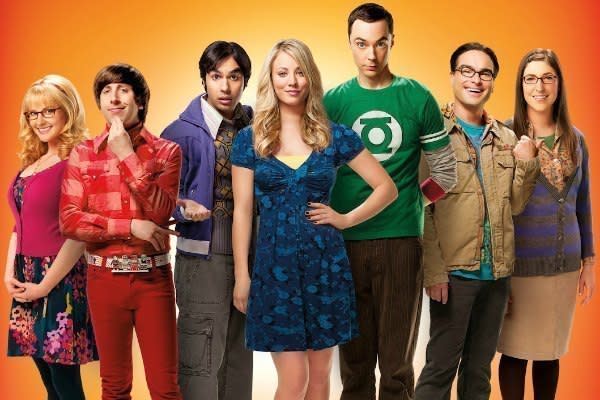The Big Bang Theory and the Terrible Sitcom Paradigm


I have something of a love hate relationship with The Big Bang Theory. It is, if you’ll pardon the pun, something I should in theory quite enjoy – I’m a fan of all the nerd stuff they talk about, I have a cursory interest in science, and I like self-deprecating humour. On paper, then, it’s actually got a lot of elements that I’d enjoy, and, full disclosure, there are moments I do enjoy. After all, there’s been nearly ten years of it – it’d be in a pretty sorry state if there weren’t at least a few funny jokes.
But then, a lot of the time, most of the jokes are like this. Because The Big Bang Theory is, to be honest, an extremely lazy, at times quite cynical, and actually quite regressive programme. It’s probably best encapsulated by the seventh episode of season five – The Good Guy Fluctuation.
(At this point I should note that I happened to catch it while channel surfing, because the internet had gone down; I also then subsequently researched which episode number it was for this article. I don’t know that sort of information off the top of my head.)
Here’s the synopsis of this episode, which I’ve taken from IMDb:
Sheldon tries to get into the spirit of Halloween by trying to scare the guys after they prank him. Leonard seeks Penny’s advice when an attractive comic book artist takes an interest in him.
The first line represents some pretty standard sitcom fare, of course; the back and forth pranking is a staple of these shows, and I’ve no doubt there are variations on a similar theme in Friends, How I Met Your Mother, and so on and so forth. Certainly I know that Community did it, and it’s not exactly outside the realms of possibility for Seinfeld to have done it either. So, yes, it’s somewhat derivative, but that’s not exactly a problem specific to The Big Bang Theory. (Perhaps somewhat ironically, the production title card at the end of this particular episode is something of a commentary on how cliché it is to criticise a lack of originality. I point this out only because I like to consider myself more self-aware than The Big Bang Theory, which I realise I’m starting to sound like a fan of again.)
Few of the above shows, however, rely on such utterly lazy jokes throughout their plots. In this particular episode of The Big Bang Theory, we were treated to the ‘hilarious’ punchlines of “Indians like snakes”, “Jews are liars”, and “women have periods”. It’s simply bland humour aimed at the lowest common denominator, and reliant pretty much wholly on stereotypes and clichés. At best, it’s vacuous and vapid nonsense; at worst, it’s bordering on the offensive.
Which brings me then to the second line of the synopsis: Leonard and the attractive comic book artist. (Who is, presumably, not important enough to be named in said synopsis, but no matter.) The Big Bang Theory’s problems with gender are quite well documented, at this point; if you’re still interested, though, this is quite a good piece on The Big Bang Theory’s gender stereotyping. But here, though, it’s actually worse – the women are vilified for expressing sexual desire and being attractive (consider Alice the artist’s “powers of evil”), they’re singular and unique for expressing fairly common interests, and worst of all, we’ve got Leonard as the nice guy. Here he is, believing he deserves plaudits for not cheating – essentially the bare minimum in relationship, realistically – yet at the same time wishing he had cheated, and holding up that sort of behaviour as admirable. Leonard believes himself the victim because he couldn’t “have sex with both women”; because he couldn’t get everything he felt he was owed.
The show demonstrates the worst excesses of self-entitled “nerd culture”, to the extent that I’d read it as a genuinely intelligent satire if I didn’t doubt the abilities of those involved to pull that off. Alongside the lazy jokes, it propagates every toxic idea which is so entrenched in “nerd culture” – the idea that they’re still the little guy, that they deserve to come out on top at the end, and that they’re better than others because they’re not like those guys. Because they like Lord of the Rings, or science, or because they’re “nice guys”.
The Big Bang Theory isn’t a loving celebration of “nerd culture” or anything like that, as it is so often perceived. In fact, The Big Bang Theory is actually a bloated, cynical mess of a program, one that panders to the lowest common denominator, and is ultimately genuinely quite awful.
(At this point, of course, I remember that these people are making $1 000 000 an episode, and I just sigh.)
Related:
Community - Introduction to Fantastic Sitcoms
Like this article? Hate this article? Why not follow me on twitter for more, or send me a message on facebook to tell me what you thought? You can also find more of my articles for Yahoo here, or check out my blog here.


 Yahoo News
Yahoo News 
